新目标英语八年级下Unit 3 Could you please clean your room 单元导学课件
文档属性
| 名称 | 新目标英语八年级下Unit 3 Could you please clean your room 单元导学课件 | 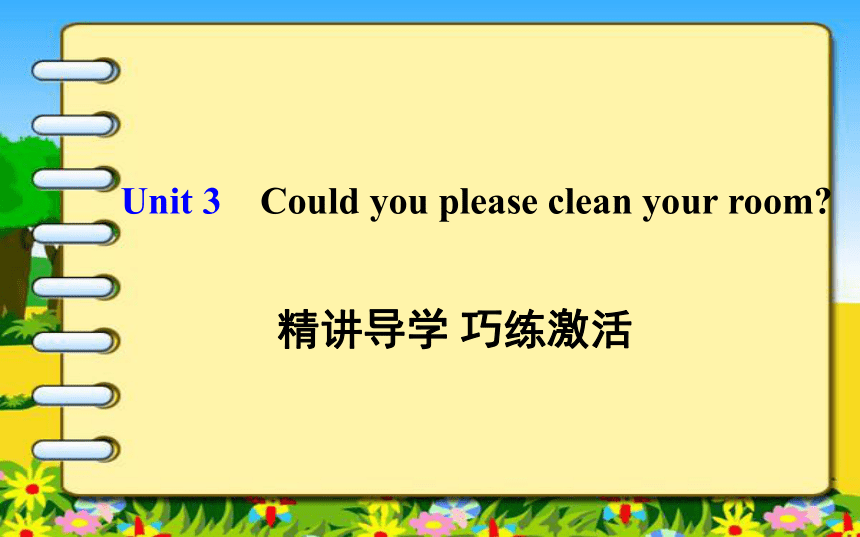 | |
| 格式 | zip | ||
| 文件大小 | 4.8MB | ||
| 资源类型 | 教案 | ||
| 版本资源 | 人教新目标(Go for it)版 | ||
| 科目 | 英语 | ||
| 更新时间 | 2016-07-22 12:26:27 | ||
图片预览




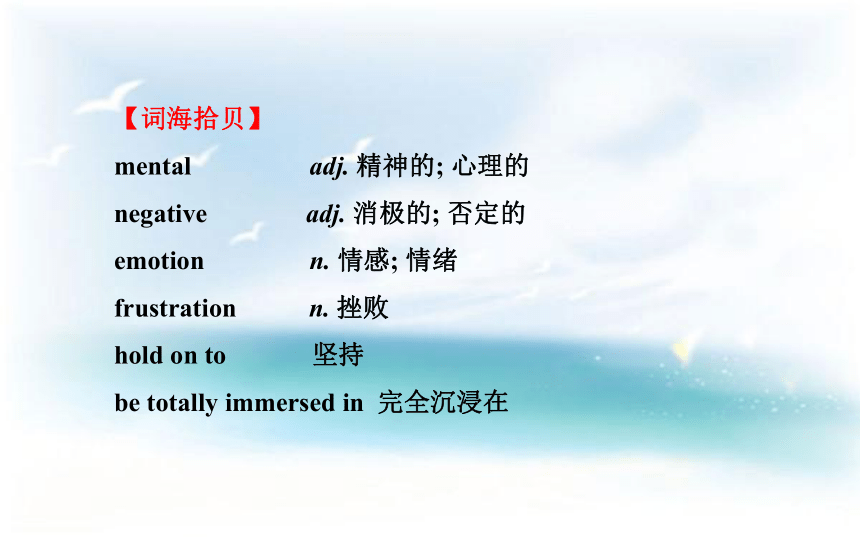

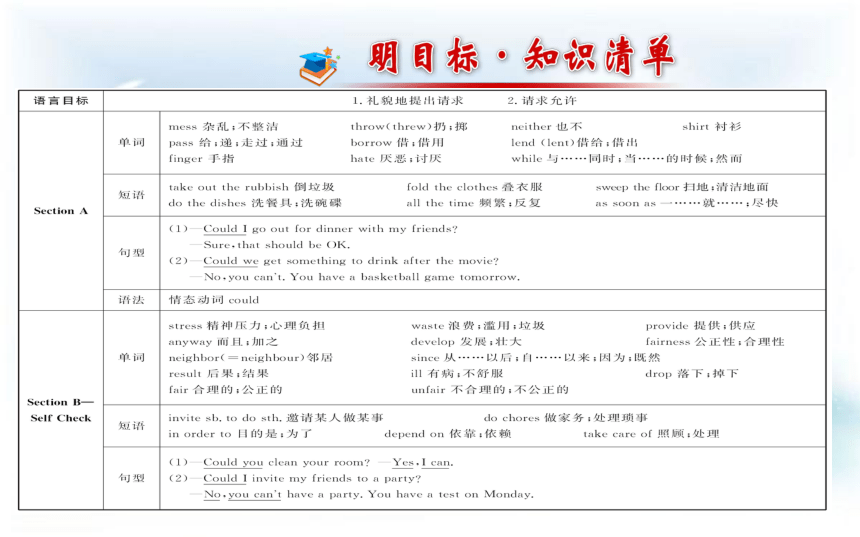
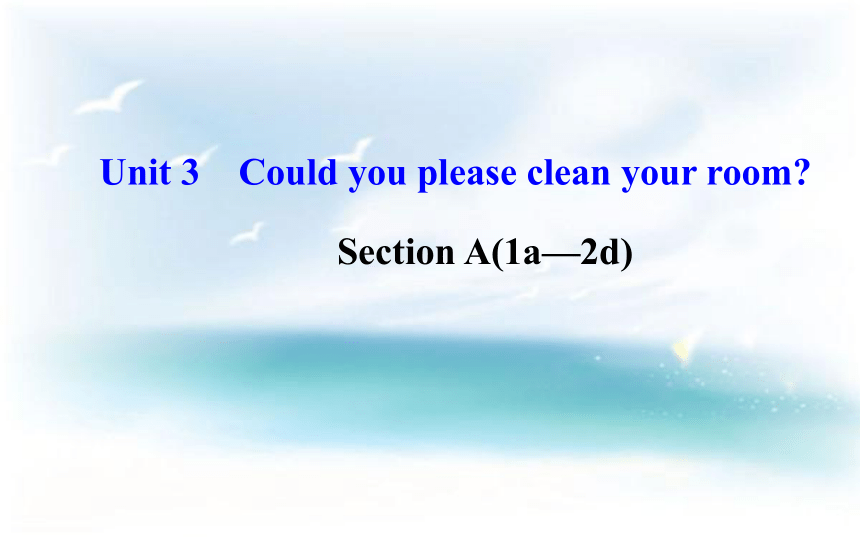
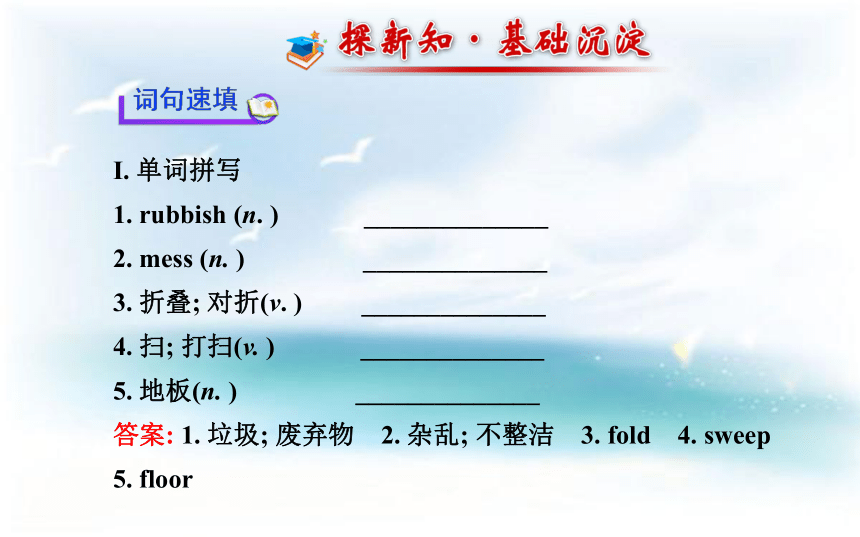
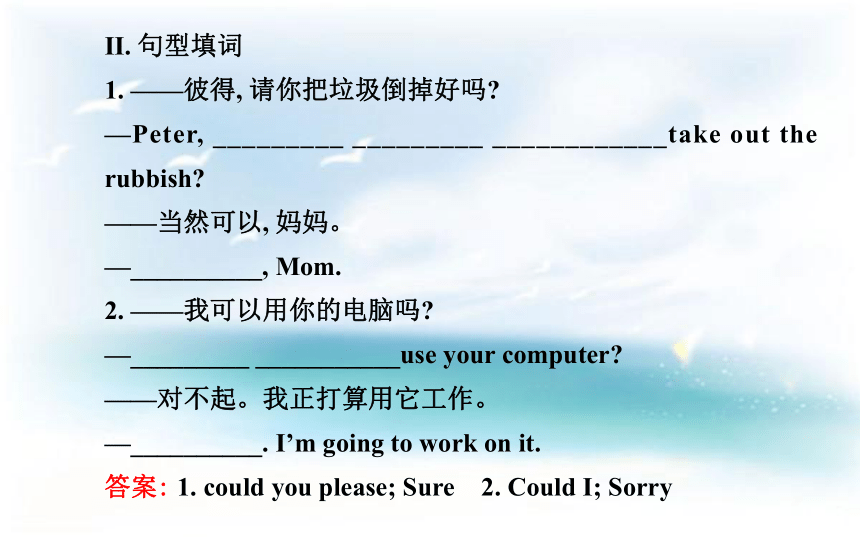
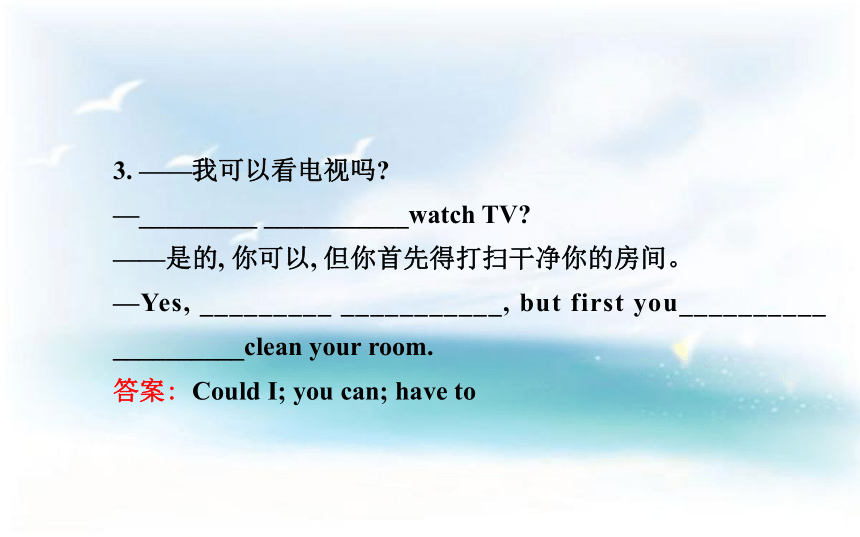
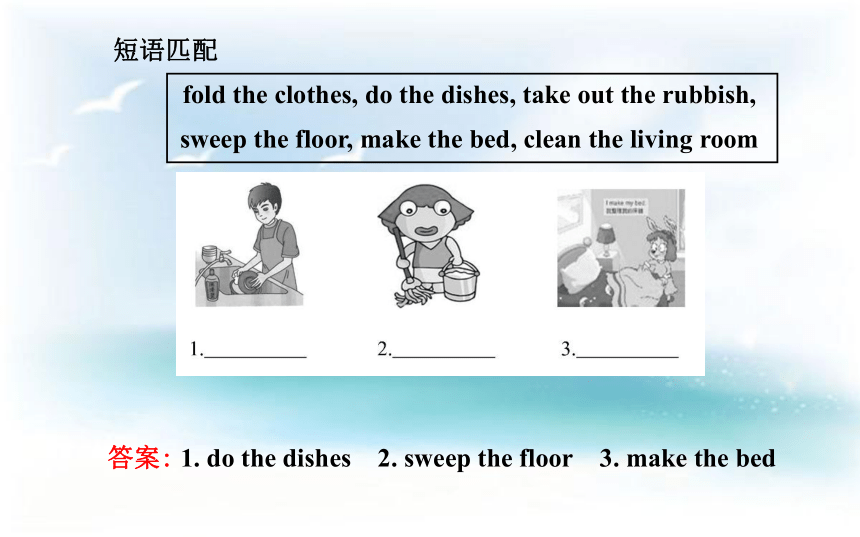
文档简介
课件144张PPT。Unit 3 Could you please clean your room? 精讲导学 巧练激活【导语】你是否有情绪消极的时候, 如压抑、愤怒或挫败之感? 读一读下面的短文, 看看是否有助你学会清理心灵的空间!Clear Your Mental Space
Think about the last time you felt a negative emotion like depression, anger, or frustration. What was going through your mind as you were going through that negativity?
The next time you find yourself under a very stressful condition, or you feel angry or frustrated, stop. Yes, that’s right, stop. Whatever you’re doing, stop and sit for one minute. When the minute is over, ask yourself, “Am I willing to keep holding on to this negative emotion as I go through the rest of the day? ”
Once you’ve allowed yourself to be totally immersed in the emotion and really feel it, you will be surprised to find that the emotion clears rather quickly. 【词海拾贝】
mental adj. 精神的; 心理的
negative adj. 消极的; 否定的
emotion n. 情感; 情绪
frustration n. 挫败
hold on to 坚持
be totally immersed in 完全沉浸在【我的感悟】
When you immerse yourself in the emotion, and realize that it is only emotion, it loses its control.
(当你沉浸在某种情绪之中, 并意识到那只是一种情绪时, 你就摆脱了它的控制。)Unit 3 Could you please clean your room?
Section A(1a—2d) Ⅰ. 单词拼写
1. rubbish (n. ) ______________
2. mess (n. ) ______________
3. 折叠; 对折(v. ) ______________
4. 扫; 打扫(v. ) ______________
5. 地板(n. ) ______________
答案: 1. 垃圾; 废弃物 2. 杂乱; 不整洁 3. fold 4. sweep
5. floorⅡ. 句型填词
1. ——彼得, 请你把垃圾倒掉好吗?
—Peter, _________ _________ ____________take out the rubbish?
——当然可以, 妈妈。
—__________, Mom.
2. ——我可以用你的电脑吗?
—_________ ___________use your computer?
——对不起。我正打算用它工作。
—__________. I’m going to work on it.
答案: 1. could you please; Sure 2. Could I; Sorry 3. ——我可以看电视吗?
—_________ ___________watch TV?
——是的, 你可以, 但你首先得打扫干净你的房间。
—Yes, _________ ___________, but first you__________ __________clean your room.
答案: Could I; you can; have to短语匹配
fold the clothes, do the dishes, take out the rubbish,
sweep the floor, make the bed, clean the living room答案: 1. do the dishes 2. sweep the floor 3. make the bed答案: 4. take out the rubbish 5. clean the living room
6. fold the clothes①Could you please sweep the floor?
②Could I go out for dinner with my
friends tonight?
_______________________________
_______________________________
答案: ①用来礼貌地提出请求。
②用来委婉地征求许可。1. take out the rubbish倒垃圾
【语境领悟】
*Peter, could you please take out the rubbish?
彼得, 请你把垃圾倒掉好吗?
*He opened his schoolbag and took out a notebook.
他打开书包, 拿出了一个笔记本。
*The dictionary is in your bag. Please take it out.
字典在你的包里。请把它拿出来。【自主归纳】
take out意为“取出; 去掉; 把……带出去”等, 是由“动词+副词”构成的短语动词, 名词作宾语时可以放在短语中间或之后, 代词作宾语时必须将其放在短语中间。【归纳拓展】 常见take构成的其他短语【学以致用】
(2013·内江中考)The plane to Chengdu______just now. You have to wait until tomorrow.
A. took off B. took after
C. took out D. took away2. Could you please sweep the floor?
请你扫一下地好吗?
【句型剖析】
Could you please. . . ? 是一个礼貌、委婉地提出请求的句式, 句中could表示委婉语气。【归纳拓展】常见表示委婉请求的句式及答语
委婉请求: Could you please+ do sth. ?
Could you+ do sth. ?
Would you please +do sth. ?
Would you+ do sth. ?
肯定回答: Sure. /Of course. /No problem. /I’d love to.
否定回答: Sorry. /Sorry, I can’t. /I’d love to, but. . . 【学以致用】
(2014·绵阳中考)—Could you tell me a good place to eat?
—______. There’s one nearby.
A. Thanks a lot B. Me neither
C. Sorry, I’m new here D. Of course【备选要点】
1. mess n. 杂乱; 不整洁
【语境领悟】
*And she won’t be happy if she sees this mess.
如果她看到这么乱会生气的。
*Sorry, the house is a mess. 抱歉, 这房间有点儿脏乱。【自主归纳】
mess作名词, 意为“杂乱; 不整洁”, 常表示脏乱或凌乱的状态, 一般多用于单数。【学以致用】
多么乱啊!咱们把它整理一下吧。
What_________ ___________!Let’s tidy it up.
答案: a mess2. Could I use your computer?
我可以用一下你的电脑吗?
【句型剖析】
Could I+动词原形+. . . ? 意为“我可以……吗? ”, 是一个委婉地请求对方许可的句式。【归纳拓展】Could I. . . ? 的常见应答语
(1)肯定回答: Sure. /Certainly. /Of course. /Yes, you can.
(2)否定回答: Sorry, you can’t. / No, you can’t. 【温馨提示】
Could I . . . ? 句式的答语中用can或can’t, 不能用could或couldn’t。【学以致用】
(2014·安徽中考)—I forgot to bring my dictionary. Could I use yours?
—Yes, you______.
A. can B. must C. could D. should3. I think two hours of TV is enough for you!
我认为你看两个小时的电视就足够了!
【句型剖析】
(1)本句是一个复合句, 复合句中two hours of TV is enough是宾语从句, 从句中省略了连词that。
(2)从句中two hours of TV虽为复数, 但却表达一种整体的概念, 因此谓语动词用第三人称单数形式。【归纳拓展】“主谓一致”
当时间、长度、距离或其他可数名词表示一个完整的整体概念用作主语时, 其后的谓语动词应用单数形式与之匹配。
Two years is quite a long time.
两年是相当长的一段时间。【学以致用】
Thirty students__________ (be)not a big number for a class.
答案: isⅠ. 用所给词的适当形式填空
1. Sarah often does the __________(dish) at home.
2. —Could you please __________(fold) your clothes, Nick?
—No problem.
3. —Could I __________(turn) on the TV, Mom?
—Yes, you can, but first you have to __________(clean) your room.
答案: 1. dishes 2. fold 3. turn; clean 4. Our teacher will be angry if you __________(make) the classroom a mess.
5. Tom, turn off the computer, please. I think two hours of games __________(be) enough for you.
答案: 4. make 5. isⅡ. 单项选择
1. It’s hot in the room. Could you please______the window, Jack?
A. to open B. opening
C. opened D. open
2. Oh, so much rubbish! Could you please______?
A. take out it B. take it out
C. take out them D. take them out3. Could you please______noise here? The baby is sleeping.
A. not to make B. don’t make
C. not make D. not making
4. —Please make______bed after getting up, David.
—OK, Mom.
A. a B. an C. the D. /
5. —Could I use your CD player?
—______, but please give it back soon.
A. Yes, you could B. Yes, you can
C. No, you couldn’t D. No, you can’tUnit 3 Could you please clean your room?
Section A(3a—4c) Ⅰ. 单词拼写
1. neither (adv. ) ______________
2. pass (v. ) ______________
3. 借; 借用(v. ) ______________
4. 借给; 借出(v. ) ______________
5. 厌恶; 讨厌(v. ) ______________
答案: 1. 也不 2. 给; 递; 走过; 通过 3. borrow 4. lend
5. hateⅡ. 短语互译
1. in front of ______________
2. 频繁; 反复 ______________
3. 一……就……; 尽快 ______________
答案: 1. 在……前面 2. all the time 3. as soon asⅢ. 句型填词
1. 你把狗带出去遛遛好吗?
Could you please _________the dog _________a walk?
2. 整整一周她没有做任何家务, 我也没做。
For one week, she did not do any housework and_________ ___________I.
3. 看完电影后我能和朋友们闲逛吗?
__________ __________hang out with my friends after the movie?
答案: 1. take; for 2. neither did 3. Could I
阅读短文, 判断正误(T/F)
( )1. Last month, when Nancy came home from school, the dog welcomed her.
( )2. As soon as Nancy sat down in front of the TV, her mom came over and asked her to take the dog for a walk.
( )3. Nancy thought she was more tired than her mother because she worked all day at school.
( )4. Neither Nancy nor her mother did any housework for a month.
答案: 1~4. TTFF1. neither adv. 也不
【语境领悟】
*For one week, she didn’t do any housework and neither did I.
整整一周她没有做任何家务, 我也没做。
*Jack has never been to Shanghai and neither has Jim.
杰克从没去过上海, 吉姆也没去过。【自主归纳】
neither作副词, 意为“也不”, 置于句首, 表示前面的否定的内容也适用于另一个人或物, 句子须采用倒装语序, 此时neither还可用nor来替换。【归纳拓展】neither用法小结【温馨提示】
(1)表示“既……也……; 两者都……”用both. . . and. . . 连接并列成分, 连接并列主语时, 谓语动词用复数。
(2)表示“或者……或者……(二者任选其一)”, 用either. . . or。
(3)表示“(三者以上)都不”, 用none (of)。【学以致用】
(2014·宜宾中考)—I’m not going swimming this afternoon.
—______. I have to help my mother do some cleaning.
A. So am I B. So I am
C. Neither am I D. Neither I am【授课备选】
(2014·泰安中考)I made a call to my parents yesterday, but ______of them answered it.
A. either B. none C. neither D. nobody2. borrow v. 借; 借用lend v. 借给; 借出
【语境领悟】
*Could I borrow that book?
我能借那本书吗?
*Could you lend me some money?
你能借给我一些钱吗? 【自主归纳】【归纳拓展】
(1)borrow, lend均为非延续性动词, 不能与表示一段时间的时间状语连用。
(2)表示“借某物多长时间”, 要用延续性动词keep“保管; 保存”来表示。
You can keep this book for two weeks.
这本书你可以借两周。【图解助记】【学以致用】
(2014·南充中考)—Excuse me, can I______your pen?
—Sorry, I have______it to Bob.
A. borrow; lent B. borrow; borrowed
C. lend; borrowed D. lent; lent【备选要点】
1. hate v. 厌恶; 讨厌
【语境领悟】
*I hate to do chores. 我讨厌做家务。
*I hate rainy days. 我讨厌下雨天。
*Jenny hates getting up early in winter.
珍妮讨厌在冬天早起。【自主领悟】
hate作动词, 意为“厌恶; 讨厌”, 常带有某种强烈的感彩, 其反义词是动词like“喜欢”或love“热爱”。【归纳拓展】hate的常用结构 ①hate+ n. /pron. 憎恨(恶)/不喜欢某人(物) ②hate+ to do/doing sth. 不喜欢/讨厌做某事 ③hate+ sb. + to do/doing sth. 不喜欢/讨厌某人做某事【学以致用】
(2014·武汉中考)—Do you know if Jack will drive to London this weekend?
—Jack? Never! He______driving so far.
A. has hated B. will hate
C. hated D. hates2. chore n. 杂务; 乏味无聊的工作
【语境领悟】
*I like other chores.
我喜欢其他的杂务。
*As a housewife, she has to do almost all the housework.
作为一位家庭主妇, 她几乎要做全部的家务。【自主归纳】
(1)chore为可数名词, 指(家庭中、办公室里、农场里等)杂务(事), 尤其指日常的普通工作, 令人不愉快/疲劳的工作。
(2)housework为不可数名词, 指像做饭、洗衣服、打扫卫生之类的家务活。【学以致用】
Jim thinks cleaning the blackboard is a boring______.
A. work B. chore
C. housework D. homework3. while conj. 与……同时; 当……的时候; 而; 然而
【语境领悟】
*I’ll finish my homework while you help me with the dishes.
你帮我洗餐具的时候我将完成我的作业。
*While I was reading, she was listening to music.
我在看书时, 她在听音乐。【自主领悟】
while作连词, 意为“在……期间; 当……的时候”, 引导的从句中的动词必须是延续性动词。例如: While children have fun, parents can take dance lessons on the beach.
孩子们玩耍时, 家长们可以在海滩上学跳舞。【归纳拓展】while用法小结【学以致用】
(2014·贵阳中考)In China and some other countries, it is impolite to speak loudly______you are having a meal.
A. before B. while C. after4. as soon as一……就……; 尽快
【语境领悟】
*My mom came over as soon as I sat down in front of the TV.
我一在电视机前坐下, 妈妈就过来了。
*I’ll call you as soon as I arrive in New York.
一到纽约我就给你打电话。
*Please finish the task as soon as you can.
请你尽快完成这项任务。【自主归纳】
as soon as意为“一……就……; 尽快”, 用来引导时间状语从句, 从句时态遵循以下原则:
(1)当主句用一般过去时, as soon as引导的时间状语从句用一般过去时或过去完成时。
(2)当主句用一般将来时, as soon as引导的时间状语从句用__________(一般现在时/一般将来时)。
答案: 一般现在时 【学以致用】
(2014·菏泽中考)—When will you return the book to me?
—I’ll give it to you______I finish it.
A. once B. until C. as soon as D. unless情态动词could
【语境领悟】
仔细观察下列句子, 体会情态动词could在哪些句子中表示委婉提出请求, 在哪些句子中表示请求允许。
1. Could you please clean your room?
2. Could you take out the rubbish?
3. Could you please take the dog for a walk?
4. Could I use your computer?
5. Could we get something to drink after the movie? 【知识构建】情态动词could的句式结构及常见答语:
1. could表示委婉地请求, 其句型结构主要有:
(1)Could you +动词原形+. . . ?
(2)Could you please+动词原形+. . . ?
意为“请你做……好吗? ”句型(2)比句型(1)语气更加委婉。肯定回答: Yes, sure. /Sure. /Of course. /No problem. 否定回答: Sorry. /Sorry, I can’t. 2. could表示请求允许, 其句型结构为:
Could I/we +动词原形+. . . ? 意为“请问我(们)能做……吗? ”
肯定回答: Sure. /Of course. /No problem. 否定回答: I’m sorry/Sorry, you can’t. 若关系比较亲近, 也可以直接说No, you can’t. 【温馨提示】在以上句子结构中情态动词could不是can的过去式, 而是用来表示委婉语气, 后跟动词原形。【学以致用】
1. —Could you please______these books to the classroom?
—Sure, Mr. Green.
A. taking B. to take
C. takes D. take
2. —Could I borrow your bike?
—______. But please return it by Monday.
A. I’m sorry B. Of course
C. Let me see D. No, thanks3. —______you help me carry the heavy box, Michael?
—With pleasure.
A. Must B. Should C. Could D. Need
4. —Could I hang out with my friends now?
—Yes, you______.
A. could B. can C. should D. need
5. —Could I go to the movies, Mom?
—______. But you must be back by ten o’clock.
A. Sorry, you couldn’t B. Sorry, you can’t
C. I don’t think so D. CertainlyⅠ. 单项选择
1. —Could I______your iPad, Alice?
—Of course. Here you are.
A. lend B. keep C. borrow D. return
2. —What’s your plan for the summer holidays?
—I’ll go to Beijing______the school term ends.
A. in order that B. so that
C. as soon as D. even though3. ______of my parents likes rock music. They think that it’s too noisy.
A. Both B. Neither
C. None D. All
4. Bob______to do the dishes because he thinks it’s boring.
A. loves B. likes
C. wants D. hates5. —Could you please______when you go out? It smells terrible in the room.
—Sure. But where should I put it?
A. take out the rubbish
B. sweep the floor
C. turn off the light
D. fold the clothesⅡ. 句型转换: 将下列句子改为同义句
1. Jim doesn’t know the way to the train station and neither do I.
__________Jim__________I__________the way to the train station.
2. The minute I arrive there I will ring you up.
I will ring you up__________ _________ ___________I arrive there.
3. You are angry, but I’m angry too.
I’m just__________ ________ ____________you.
答案: 1. Neither; nor; know 2. as soon as 3. as angry as4. Could I borrow your pen, John?
Could you__________ your pen __________me, John?
5. After supper, Ms Green often walks the dog.
After supper, Ms Green often __________the dog__________ __________ __________.
答案: 4. lend; to 5. takes; for a walkUnit 3 Could you please clean your room?
Section B(1a—1e) Ⅰ. 单词拼写
1. snack (n. ) ______________
2. permission (n. ) ______________
3. 播放器 (n. ) ______________
4. 青少年 (n. ) ______________
答案: 1. 点心; 小吃; 快餐 2. 允许; 许可 3. player
4. teenagerⅡ. 短语互译
1. go to the store ______________
2. have a test ______________
3. 借一些钱 __________some money
4. 邀请某人参加聚会 __________sb. __________a party
答案: 1. 去商店 2. 参加考试 3. borrow 4. invite; toⅢ. 句型填词
1. ——请你打扫一下你的房间好吗?
—__________you _________your room?
——好的, 可以。
—Yes, I__________.
2. ——我可以邀请我的朋友来参加聚会吗?
—__________I _________my friends _________a party?
——不行, 你不能举办聚会。星期一你要考试。
—No, you ________have a party. You_________ __________ _________on Monday.
答案: 1. Could; clean; can 2. Could; invite; to; can’t; have a test①—Could you clean your room?
—Yes, I can.
②—Could I invite my friends to a party?
—No, you can’t have a party.
______________________________________
答案: 情态动词can。invite v. 邀请; 招待
【语境领悟】
*Could I invite my friends to a party?
我能邀请我的朋友来参加聚会吗?
*They’ll invite a famous scientist to give a speech.
他们将邀请一位著名的科学家作演讲。【自主归纳】
invite作及物动词, 意为“邀请; 招待”; 常用结构:
(1)invite sb. to +活动名称/地点名词, 意为“邀请某人参加某项活动/邀请某人去某地”。
(2)invite sb. to do sth. 意为“邀请某人做某事”。【学以致用】
(2013·南昌中考)Lucy is shy. She would not invite her classmates ______dancing with her.
A. practice B. practices
C. practicing D. to practice从方框中选词并用其适当形式填空
invite, play, snack, have to, go
1. Mrs. Green is _________to the store this afternoon.
2. We need to buy some drinks and _________for the party.
3. Tom decided _________all his friends to his birthday party.
4. —Could I use your CD _________?
—Sure. But you should return it soon.
5. —Can Bill come and play soccer with us?
—Sorry, he can’t. He _________help his parents with chores.
答案: 1. going 2. snacks 3. to invite 4. player 5. has to单项选择
1. (2014·临沂中考)Mike went to the library _____some books yesterday.
A. borrow B. to borrow C. borrows D. borrowed
2. Whom did you _________to your birthday party?
A. make B. say C. invite D. tell
3. —Could you buy _________books for me?
—Sure.
A. some B. few C. any D. little4. —Mom, could I go out with friends on weekends?
—________
A. Yes, you could. B. I don’t think so.
C. Yes, you can. D. Sure, you can’t.
5. My parents often ask me__________my bedroom.
A. clean B. to clean C. cleaning D. cleansUnit 3 Could you please clean your room?
Section B(2a—2e) Ⅰ. 单词拼写
1. waste (v. & n. ) ______________
2. provide (v. ) ______________
3. since (conj . & prep. & adv. ) ______________
4. 而且; 加之(adv. ) ______________
5. 落下; 掉下(v. ) ______________
答案: 1. 浪费; 滥用; 垃圾 2. 提供; 供应
3. 因为; 既然; 从……以后; 自……以来 4. anyway 5. dropⅡ. 短语互译
1. 目的是; 为了 in________ __________
2. 依靠; 依赖 __________on
3. 照顾; 处理 _________ ___________of
4. help with __________________
5. as a result __________________
6. fall ill __________________
答案: 1. order to 2. depend 3. take care 4. 在某方面帮助; 帮助做某事 5. 结果是; 因此 6. 生病; 病倒Ⅲ. 句型填词
1. 我们能否就让他们做好自己学生该做的工作?
Could we just _________them _________their job as students?
2. 我认为对孩子们来说学习如何做家务以及帮助父母做家务是十分重要的。
I think_________ ___________important for children ________ __________how to do chores and help their parents with housework.
3. 孩子们越早学会独立, 对他们的未来就越好。
_________ ___________kids learn to be independent, _______ ___________it is for their future.
答案: 1. let; do 2. it is; to learn 3. The earlier; the better①I think doing chores is not so difficult.
②Doing chores helps to develop children’s
independence and teaches them to understand
the idea of fairness.
________________________________________________
________________________________________________
答案: 谓语动词用第三人称单数形式。1. in order to目的是; 为了
【语境领悟】
*They should spend their time on schoolwork in order to get good grades and get into a good university. 为了取得好成绩, 进入一所好大学, 他们应当把时间花在学业上。
*In order to make our dreams come true, we must work hard.
为了使我们的梦想成真, 我们必须努力工作。【自主归纳】
(1)in order to意为“目的是; 为了”, 后接动词原形, 构成短语in order to do sth. , 在句中作目的状语。
(2)其否定结构为in order not to do sth. “为了不做某事”。【妙辨异同】in order to /in order that表“目的”【归纳拓展】order的其他常见用法
(1)order作名词, 意为“命令; 指示; 顺序; 订单”等。
Please put the pictures in order.
请把这些图片按顺序排列。
(2)order作动词, 意为“命令; 点(菜、饮料等); 定(货); 预订”等。
I just want to order a glass of juice.
我只是想点一杯果汁。【学以致用】
(2014·广东中考)In order______for the meeting, my sister forced herself to get up early this morning.
A. not to be late B. not being late
C. to be late D. being late2. I think it is important for children to learn how to do chores and help their parents with housework.
我认为对孩子们来说学习如何做家务以及帮助父母做家务是很重要的。
【句型剖析】
本句是一个含有宾语从句的主从复合句, 在从句中, it是形式主语, 不定式复合结构for children to learn how to do chores and help their parents with housework是真正的主语。【归纳拓展】it作形式主语的用法
(1)当不定式(短语)、动名词(短语)或从句在句中作主语时, 常用it作形式主语置于句首, 而真正的主语放在句尾。
(2)it作形式主语的三种常见句型结构:
①It’s+adj. + to do . . .
②It’s +adj. +for sb. + to do. . .
③It’s +adj. +of sb. + to do. . . (3)It’s+adj. +for sb. +to do . . . 与It’s+adj. +of sb. +to do. . . 的用法辨析【学以致用】
(2014·齐齐哈尔中考)It’s clever______her______the math problem easily.
A. of; to solve B. for; to solve C. of; solving【备选要点】
1. since conj. 因为; 既然
prep. , conj. & adv. 从……以后; 自……以来
【语境领悟】
*Since they live in one house with their parents, they should know that everyone should do their part in keeping it clean and tidy.
既然他们与父母住在同一屋檐下, 他们应该知道每个人都应当参与做家务来保持家里干净整洁。*Since this method doesn’t work, let’s try another.
既然这个方法不行, 我们试试另一个。
*I decided to buy a new computer since the old one at home didn’t work.
因为家里的旧电脑不能用了, 我决定买台新的。【自主领悟】
since作连词, 常用来陈述原因及理由, 意为“因为; 既然; 由于”, 引导原因状语从句, 可置于主句前, 也可置于主句之后。【归纳拓展】since的其他用法
(1)since作连词, 引导时间状语从句, 意为“自……以来”, 其引导的从句用一般过去时, 主句则常用现在完成时。
He has worked in this factory since he came here.
自从他来到这里他就在这个工厂工作。(2)since作介词, 构成介词短语, 在句中作时间状语, 意为“自……以来”。
It has been raining since morning.
从早晨到现在一直在下雨。
(3)since作副词, 意为“此后, 自那以后; 后来”。常构成短语ever since“从那时到现在”。
He has studied hard ever since.
自那以后, 他一直努力学习。【学以致用】
(2014·安徽中考)Rick has learned a lot about Chinese culture ______he came to China.
A. before B. when
C. until D. since2. waste n. 浪费; 垃圾v. 浪费; 滥用
【语境领悟】
*Housework is a waste of their time.
家务劳动是在浪费他们的时间。
*We don’t allow students to throw waste in the campus.
我们不允许学生在校园里丢垃圾。
*Don’t waste food, please.
请不要浪费粮食。【自主归纳】
(1)waste作名词, 意为“浪费; 垃圾”, 常用短语a waste of time“浪费时间”。
(2)waste作动词, 意为“浪费; 滥用”, 常用作及物动词, 后跟名词或代词作宾语。【学以致用】
(2013·苏州中考)I had to throw away all the food after I left the fridge open. What a__________(浪费)!
答案: waste3. depend on依靠; 信赖
【语境领悟】
*Children these days depend on their parents too much.
现在的孩子过度依赖他们的父母。
*We should depend on ourselves, not our parents.
我们应该靠自己而不靠父母。
*Whether we will climb the mountain tomorrow depends on the weather.
我们明天是否去爬山取决于天气。【自主归纳】
depend on意为“依靠; 信赖”, 还可意为“取决于”, 宾语可以是人, 也可以是物。depend on还常与反身代词连用, 构成短语depend on oneself, 意为“依靠某人自己”。【学以致用】
(2014·遂宁中考)We are planning to go for a picnic this weekend, but it______the weather.
A. keeps on B. puts on C. depends on4. The earlier kids learn to be independent, the better it is for their future.
孩子们越早学会独立, 对他们的未来就越有好处。
【句型剖析】
The+比较级……, the+比较级……意为“越……, 就越……”, 固定句式。
The harder you study, the better grades you’ll get.
你学习越努力, 你取得的成绩就越好。【学以致用】
(2013·临沂中考)—There was thick haze(雾霾)in our city this morning. What do you think of it?
—I think ______cars we drive, ______pollution our city
will have.
A. the fewer; the fewer
B. the fewer; the less
C. the more; the fewer
D. the more; the less完成句子
1. 过度看电视对孩子们来说是浪费时间。
Watching TV too much is_________ __________ ____________ _________for children.
2. 你没有必要担心你的未来。
There is___________ ___________ ________you__________ worry about your future.
答案: 1. a waste of time 2. no need for; to3. 事实上, 我不介意工作辛苦。
In fact, I_________ _________ ____________hard.
4. 对于学生来说, 仅仅在学校里取得好成绩是不够的。
__________ __________ __________for students _________get good grades at school.
5. 每个人都应该学会如何照顾自己。
Everyone should learn_________ __________ ___________ __________of himself or herself.
答案: 3. don’t mind working 4. It’s not enough; to
5. how to take care单项选择
1. If our parents do everything for us children, we won’t learn to depend __________ourselves.
A. in B. to C. on D. for
2. —Could you please __________some information for us about the students’ healthy?
—Of course, it’s my pleasure.
A. show B. give
C. pass D. provide3. The members of the team are practicing really hard __________win the coming game.
A. in order B. in order that
C. in order to D. so that
4. Don’t spend__________time on the Internet. It’s bad for your eyes.
A. too many B. too much
C. much too D. many too
5. (2014·绥化中考)The______you do for others, the______you will feel.
A. mucher; happier B. more; happier C. much; happyUnit 3 Could you please clean your room?
Section B(3a—Self Check) 【创新写作】
3b Write a letter to the Sunday Mail and express your opinion.
Dear Sir or Madam,
I think/believe that .
I agree/disagree that .
I think it is fair/unfair for children to . I think children should/should not ?
because .
For example, they should/should not ?
because .
Yours truly,
?【思路点拨】
(1)体裁: 应用文
(2)人称: 第一、三人称
(3)时态: 一般现在时【写作模板】【妙笔成篇】
_____________________________________________
_____________________________________________
_____________________________________________
_____________________________________________
_____________________________________________【参考范文】
Dear Sir or Madam,
I think that children should do some chores at home.
I disagree that children’s only job is to study and get good grades at school. Of course it is important for children to study hard. However, I think it is unfair for children to expect their parents to work hard outside and do all the chores at home. I think children should at least help their parents do some simple chores. For example, they should make their own beds and clean their own rooms because they themselves use these. They may not have time to help with the other parts of the house, but they should try to be responsible.
Yours truly,
Li Ming单项选择
1. Gina often helps ______chores at home.
A. to B. with C. for D. of
2. —Could you please ______the floor?
—No problem. I’ll do it right away.
A. do B. make C. fold D. sweep3. —Could I use your computer?
—______. I’m working on it now.
A. Yes, sure B. Sorry, you can’t
C. Yes, you could D. No, you couldn’t
4. —______I watch TV after finishing my homework?
—Yes, you can.
A. Must B. Need C. Could D. Should
5. —I think it’s the parents’ job to do chores.
—______. Children should also do some chores at home.
A. I hope so B. Don’t say so
C. I agree D. I don’t agree完成句子
1. 我认为每个家庭成员都应该做家务活。
I think every family member_________ ___________ __________.
2. 我能用一下你的手机吗?
__________ __________ __________your mobile phone?
3. 首先你得把房间打扫一下。
First, you_________ _________ ____________the room.
答案: 1. should do housework/chores
2. Could I use 3. have to clean 4. 务必在十点之前回来。
Be sure to________ __________ ____________ten o’clock.
5. 请你把垃圾倒掉好吗?
__________ __________ __________take out the rubbish?
答案: 4. come back before 5. Could you please单元复习课
Unit 3Ⅰ. 词汇速记
1. 杂乱, 不整洁(n. ) ______________
2. 借; 借用(v. ) ______________
3. 厌恶; 讨厌(v. ) ______________
4. 浪费; 垃圾; 滥用(n. & v. ) ______________
5. 提供; 供应(v. ) ______________
答案: 1. mess 2. borrow 3. hate 4. waste 5. provide6. 发展; 壮大(v. ) ______________
7. 落下; 掉下(v. ) ______________
8. throw (v. ) →__________(过去式)扔; 掷
9. fair (adj. ) →__________(n. )公正性; 合理性
10. independent (adj. ) →__________(n. )独立
答案: 6. develop 7. drop 8. threw 9. fairness
10. independenceⅡ. 短语互译
1. 倒垃圾 __________ __________the rubbish
2. 叠衣服 __________the clothes
3. 扫地; 拖地 __________the floor
4. 目的是; 为了 __________ __________to
5. 依靠; 信赖 __________on
6. do chores ________
7. all the time ________
8. take care of ________
答案: 1. take out 2. fold 3. sweep 4. in order 5. depend
6. 做家务; 处理琐事 7. 频繁; 反复 8. 照顾; 处理Ⅲ. 句型攻关
1. ——请你把教室打扫一下好吗?
—_________ _________ ____________clean the classroom?
——好的, 当然可以。
—Yes, __________.
2. ——我能用一下你的钢笔吗?
—________ __________ ___________your pen?
——不, 你不能。我正在写信。
—__________, you__________. I’m writing a letter.
答案: 1. Could you please; sure 2. Could I use; No; can’t3. ——现在我能和朋友去逛街吗?
—__________ __________hang out with my friends now?
——当然能, 但你得先把餐具洗一下。
—__________, __________you__________ __________ __________the dishes first.
答案: Could I; Sure; but; have to doⅣ. 语法专练
1. —Could I borrow your camera?
—______, but please give it back in two days.
A. I’m really sorry B. Of course
C. Certainly not D. No, you can’t
2. —Could you please do the dishes?
—______. I’m busy doing my homework.
A. Yes, sure B. Yes, I can
C. Sorry, I couldn’t D. Sorry, I can’t3. —Could you please pass me the pen?
—______.
A. Yes, I could B. No, I couldn’t
C. Sure. Here you are D. I don’t think so
4. —Could I______to the movies with friends, Mom?
—Yes, you can.
A. go B. went C. going D. to go
5. —______I try on the T-shirt in the window?
—______. It’s just on show(展出).
A. Could; Yes, you can B. Can; Sorry, you couldn’t
C. Could; Sorry, you can’t D. Can; Yes, you couldⅤ. 真题体验
1. (泰州中考)—Could you carry that heavy box for me?
—______. I’m strong enough.
A. Not at all B. No problem
C. Good idea D. Never mind
【解析】选B。考查情景交际。由答语“I’m strong enough. ”可知其前用肯定答语。Could you. . . ? 是一个委婉地提出请求的句式, 其肯定回答常见有Sure. /Of course. /No problem. 。故选B。2. (烟台中考)—How long may I______your dictionary?
—For one week. But it mustn’t______to others.
A. keep; be lent B. borrow; lend
C. lend; be borrowed D. have; borrow
【解析】选A。考查动词辨析。句意: ——你的词典我可以借多久? ——一周。但绝对不能把它借给别人。lend, borrow是非延续性动词, 表示“借多久”只能用延续性动词keep, 因此第一个空格处填keep; 表示“借出”用lend, 且答语中主语it与lend是动宾关系, 应该用被动语态(be+过去分词)。故选A。3. (广安中考)—Neither Tony nor I______interested in playing Weibo.
—You are out.
A. am B. is C. are
【解析】选A。考查主谓一致。neither. . . nor. . . 连接并列主语时, 谓语动词遵循“就近原则”。由nor后的“I”可知谓语动词用am。4. (广东中考)Today’s young people can’t live without smart phones. They keep their hands on the phones wherever they go, even while they______meals.
A. had B. will have
C. are having D. were having
【解析】选C。考查时态。句意: 现在的年轻人离不开手机。无论他们走到哪里, 他们都把手放在手机上甚至是当他们正在吃饭的时候。while“当……时”, 引导时间状语从句, 从句中的动作正在进行, 再结合today一词可知用现在进行时。5. (咸宁中考)—The doctor told me not to eat too much, but I find it difficult.
—The doctor is right. ______you eat, ______you will be.
A. The less; the healthier
B. The less; the more healthier
C. The more; the healthier
D. The more; the more healthier
【解析】选A。考查比较等级。根据句意: ——医生告诉我不要吃太多, 但是我发现很困难。——医生是正确的。你吃得越少, 你就会越健康。“the+比较级……, the+比较级……”表示“越……, 就越……”, 是固定句式。
Think about the last time you felt a negative emotion like depression, anger, or frustration. What was going through your mind as you were going through that negativity?
The next time you find yourself under a very stressful condition, or you feel angry or frustrated, stop. Yes, that’s right, stop. Whatever you’re doing, stop and sit for one minute. When the minute is over, ask yourself, “Am I willing to keep holding on to this negative emotion as I go through the rest of the day? ”
Once you’ve allowed yourself to be totally immersed in the emotion and really feel it, you will be surprised to find that the emotion clears rather quickly. 【词海拾贝】
mental adj. 精神的; 心理的
negative adj. 消极的; 否定的
emotion n. 情感; 情绪
frustration n. 挫败
hold on to 坚持
be totally immersed in 完全沉浸在【我的感悟】
When you immerse yourself in the emotion, and realize that it is only emotion, it loses its control.
(当你沉浸在某种情绪之中, 并意识到那只是一种情绪时, 你就摆脱了它的控制。)Unit 3 Could you please clean your room?
Section A(1a—2d) Ⅰ. 单词拼写
1. rubbish (n. ) ______________
2. mess (n. ) ______________
3. 折叠; 对折(v. ) ______________
4. 扫; 打扫(v. ) ______________
5. 地板(n. ) ______________
答案: 1. 垃圾; 废弃物 2. 杂乱; 不整洁 3. fold 4. sweep
5. floorⅡ. 句型填词
1. ——彼得, 请你把垃圾倒掉好吗?
—Peter, _________ _________ ____________take out the rubbish?
——当然可以, 妈妈。
—__________, Mom.
2. ——我可以用你的电脑吗?
—_________ ___________use your computer?
——对不起。我正打算用它工作。
—__________. I’m going to work on it.
答案: 1. could you please; Sure 2. Could I; Sorry 3. ——我可以看电视吗?
—_________ ___________watch TV?
——是的, 你可以, 但你首先得打扫干净你的房间。
—Yes, _________ ___________, but first you__________ __________clean your room.
答案: Could I; you can; have to短语匹配
fold the clothes, do the dishes, take out the rubbish,
sweep the floor, make the bed, clean the living room答案: 1. do the dishes 2. sweep the floor 3. make the bed答案: 4. take out the rubbish 5. clean the living room
6. fold the clothes①Could you please sweep the floor?
②Could I go out for dinner with my
friends tonight?
_______________________________
_______________________________
答案: ①用来礼貌地提出请求。
②用来委婉地征求许可。1. take out the rubbish倒垃圾
【语境领悟】
*Peter, could you please take out the rubbish?
彼得, 请你把垃圾倒掉好吗?
*He opened his schoolbag and took out a notebook.
他打开书包, 拿出了一个笔记本。
*The dictionary is in your bag. Please take it out.
字典在你的包里。请把它拿出来。【自主归纳】
take out意为“取出; 去掉; 把……带出去”等, 是由“动词+副词”构成的短语动词, 名词作宾语时可以放在短语中间或之后, 代词作宾语时必须将其放在短语中间。【归纳拓展】 常见take构成的其他短语【学以致用】
(2013·内江中考)The plane to Chengdu______just now. You have to wait until tomorrow.
A. took off B. took after
C. took out D. took away2. Could you please sweep the floor?
请你扫一下地好吗?
【句型剖析】
Could you please. . . ? 是一个礼貌、委婉地提出请求的句式, 句中could表示委婉语气。【归纳拓展】常见表示委婉请求的句式及答语
委婉请求: Could you please+ do sth. ?
Could you+ do sth. ?
Would you please +do sth. ?
Would you+ do sth. ?
肯定回答: Sure. /Of course. /No problem. /I’d love to.
否定回答: Sorry. /Sorry, I can’t. /I’d love to, but. . . 【学以致用】
(2014·绵阳中考)—Could you tell me a good place to eat?
—______. There’s one nearby.
A. Thanks a lot B. Me neither
C. Sorry, I’m new here D. Of course【备选要点】
1. mess n. 杂乱; 不整洁
【语境领悟】
*And she won’t be happy if she sees this mess.
如果她看到这么乱会生气的。
*Sorry, the house is a mess. 抱歉, 这房间有点儿脏乱。【自主归纳】
mess作名词, 意为“杂乱; 不整洁”, 常表示脏乱或凌乱的状态, 一般多用于单数。【学以致用】
多么乱啊!咱们把它整理一下吧。
What_________ ___________!Let’s tidy it up.
答案: a mess2. Could I use your computer?
我可以用一下你的电脑吗?
【句型剖析】
Could I+动词原形+. . . ? 意为“我可以……吗? ”, 是一个委婉地请求对方许可的句式。【归纳拓展】Could I. . . ? 的常见应答语
(1)肯定回答: Sure. /Certainly. /Of course. /Yes, you can.
(2)否定回答: Sorry, you can’t. / No, you can’t. 【温馨提示】
Could I . . . ? 句式的答语中用can或can’t, 不能用could或couldn’t。【学以致用】
(2014·安徽中考)—I forgot to bring my dictionary. Could I use yours?
—Yes, you______.
A. can B. must C. could D. should3. I think two hours of TV is enough for you!
我认为你看两个小时的电视就足够了!
【句型剖析】
(1)本句是一个复合句, 复合句中two hours of TV is enough是宾语从句, 从句中省略了连词that。
(2)从句中two hours of TV虽为复数, 但却表达一种整体的概念, 因此谓语动词用第三人称单数形式。【归纳拓展】“主谓一致”
当时间、长度、距离或其他可数名词表示一个完整的整体概念用作主语时, 其后的谓语动词应用单数形式与之匹配。
Two years is quite a long time.
两年是相当长的一段时间。【学以致用】
Thirty students__________ (be)not a big number for a class.
答案: isⅠ. 用所给词的适当形式填空
1. Sarah often does the __________(dish) at home.
2. —Could you please __________(fold) your clothes, Nick?
—No problem.
3. —Could I __________(turn) on the TV, Mom?
—Yes, you can, but first you have to __________(clean) your room.
答案: 1. dishes 2. fold 3. turn; clean 4. Our teacher will be angry if you __________(make) the classroom a mess.
5. Tom, turn off the computer, please. I think two hours of games __________(be) enough for you.
答案: 4. make 5. isⅡ. 单项选择
1. It’s hot in the room. Could you please______the window, Jack?
A. to open B. opening
C. opened D. open
2. Oh, so much rubbish! Could you please______?
A. take out it B. take it out
C. take out them D. take them out3. Could you please______noise here? The baby is sleeping.
A. not to make B. don’t make
C. not make D. not making
4. —Please make______bed after getting up, David.
—OK, Mom.
A. a B. an C. the D. /
5. —Could I use your CD player?
—______, but please give it back soon.
A. Yes, you could B. Yes, you can
C. No, you couldn’t D. No, you can’tUnit 3 Could you please clean your room?
Section A(3a—4c) Ⅰ. 单词拼写
1. neither (adv. ) ______________
2. pass (v. ) ______________
3. 借; 借用(v. ) ______________
4. 借给; 借出(v. ) ______________
5. 厌恶; 讨厌(v. ) ______________
答案: 1. 也不 2. 给; 递; 走过; 通过 3. borrow 4. lend
5. hateⅡ. 短语互译
1. in front of ______________
2. 频繁; 反复 ______________
3. 一……就……; 尽快 ______________
答案: 1. 在……前面 2. all the time 3. as soon asⅢ. 句型填词
1. 你把狗带出去遛遛好吗?
Could you please _________the dog _________a walk?
2. 整整一周她没有做任何家务, 我也没做。
For one week, she did not do any housework and_________ ___________I.
3. 看完电影后我能和朋友们闲逛吗?
__________ __________hang out with my friends after the movie?
答案: 1. take; for 2. neither did 3. Could I
阅读短文, 判断正误(T/F)
( )1. Last month, when Nancy came home from school, the dog welcomed her.
( )2. As soon as Nancy sat down in front of the TV, her mom came over and asked her to take the dog for a walk.
( )3. Nancy thought she was more tired than her mother because she worked all day at school.
( )4. Neither Nancy nor her mother did any housework for a month.
答案: 1~4. TTFF1. neither adv. 也不
【语境领悟】
*For one week, she didn’t do any housework and neither did I.
整整一周她没有做任何家务, 我也没做。
*Jack has never been to Shanghai and neither has Jim.
杰克从没去过上海, 吉姆也没去过。【自主归纳】
neither作副词, 意为“也不”, 置于句首, 表示前面的否定的内容也适用于另一个人或物, 句子须采用倒装语序, 此时neither还可用nor来替换。【归纳拓展】neither用法小结【温馨提示】
(1)表示“既……也……; 两者都……”用both. . . and. . . 连接并列成分, 连接并列主语时, 谓语动词用复数。
(2)表示“或者……或者……(二者任选其一)”, 用either. . . or。
(3)表示“(三者以上)都不”, 用none (of)。【学以致用】
(2014·宜宾中考)—I’m not going swimming this afternoon.
—______. I have to help my mother do some cleaning.
A. So am I B. So I am
C. Neither am I D. Neither I am【授课备选】
(2014·泰安中考)I made a call to my parents yesterday, but ______of them answered it.
A. either B. none C. neither D. nobody2. borrow v. 借; 借用lend v. 借给; 借出
【语境领悟】
*Could I borrow that book?
我能借那本书吗?
*Could you lend me some money?
你能借给我一些钱吗? 【自主归纳】【归纳拓展】
(1)borrow, lend均为非延续性动词, 不能与表示一段时间的时间状语连用。
(2)表示“借某物多长时间”, 要用延续性动词keep“保管; 保存”来表示。
You can keep this book for two weeks.
这本书你可以借两周。【图解助记】【学以致用】
(2014·南充中考)—Excuse me, can I______your pen?
—Sorry, I have______it to Bob.
A. borrow; lent B. borrow; borrowed
C. lend; borrowed D. lent; lent【备选要点】
1. hate v. 厌恶; 讨厌
【语境领悟】
*I hate to do chores. 我讨厌做家务。
*I hate rainy days. 我讨厌下雨天。
*Jenny hates getting up early in winter.
珍妮讨厌在冬天早起。【自主领悟】
hate作动词, 意为“厌恶; 讨厌”, 常带有某种强烈的感彩, 其反义词是动词like“喜欢”或love“热爱”。【归纳拓展】hate的常用结构 ①hate+ n. /pron. 憎恨(恶)/不喜欢某人(物) ②hate+ to do/doing sth. 不喜欢/讨厌做某事 ③hate+ sb. + to do/doing sth. 不喜欢/讨厌某人做某事【学以致用】
(2014·武汉中考)—Do you know if Jack will drive to London this weekend?
—Jack? Never! He______driving so far.
A. has hated B. will hate
C. hated D. hates2. chore n. 杂务; 乏味无聊的工作
【语境领悟】
*I like other chores.
我喜欢其他的杂务。
*As a housewife, she has to do almost all the housework.
作为一位家庭主妇, 她几乎要做全部的家务。【自主归纳】
(1)chore为可数名词, 指(家庭中、办公室里、农场里等)杂务(事), 尤其指日常的普通工作, 令人不愉快/疲劳的工作。
(2)housework为不可数名词, 指像做饭、洗衣服、打扫卫生之类的家务活。【学以致用】
Jim thinks cleaning the blackboard is a boring______.
A. work B. chore
C. housework D. homework3. while conj. 与……同时; 当……的时候; 而; 然而
【语境领悟】
*I’ll finish my homework while you help me with the dishes.
你帮我洗餐具的时候我将完成我的作业。
*While I was reading, she was listening to music.
我在看书时, 她在听音乐。【自主领悟】
while作连词, 意为“在……期间; 当……的时候”, 引导的从句中的动词必须是延续性动词。例如: While children have fun, parents can take dance lessons on the beach.
孩子们玩耍时, 家长们可以在海滩上学跳舞。【归纳拓展】while用法小结【学以致用】
(2014·贵阳中考)In China and some other countries, it is impolite to speak loudly______you are having a meal.
A. before B. while C. after4. as soon as一……就……; 尽快
【语境领悟】
*My mom came over as soon as I sat down in front of the TV.
我一在电视机前坐下, 妈妈就过来了。
*I’ll call you as soon as I arrive in New York.
一到纽约我就给你打电话。
*Please finish the task as soon as you can.
请你尽快完成这项任务。【自主归纳】
as soon as意为“一……就……; 尽快”, 用来引导时间状语从句, 从句时态遵循以下原则:
(1)当主句用一般过去时, as soon as引导的时间状语从句用一般过去时或过去完成时。
(2)当主句用一般将来时, as soon as引导的时间状语从句用__________(一般现在时/一般将来时)。
答案: 一般现在时 【学以致用】
(2014·菏泽中考)—When will you return the book to me?
—I’ll give it to you______I finish it.
A. once B. until C. as soon as D. unless情态动词could
【语境领悟】
仔细观察下列句子, 体会情态动词could在哪些句子中表示委婉提出请求, 在哪些句子中表示请求允许。
1. Could you please clean your room?
2. Could you take out the rubbish?
3. Could you please take the dog for a walk?
4. Could I use your computer?
5. Could we get something to drink after the movie? 【知识构建】情态动词could的句式结构及常见答语:
1. could表示委婉地请求, 其句型结构主要有:
(1)Could you +动词原形+. . . ?
(2)Could you please+动词原形+. . . ?
意为“请你做……好吗? ”句型(2)比句型(1)语气更加委婉。肯定回答: Yes, sure. /Sure. /Of course. /No problem. 否定回答: Sorry. /Sorry, I can’t. 2. could表示请求允许, 其句型结构为:
Could I/we +动词原形+. . . ? 意为“请问我(们)能做……吗? ”
肯定回答: Sure. /Of course. /No problem. 否定回答: I’m sorry/Sorry, you can’t. 若关系比较亲近, 也可以直接说No, you can’t. 【温馨提示】在以上句子结构中情态动词could不是can的过去式, 而是用来表示委婉语气, 后跟动词原形。【学以致用】
1. —Could you please______these books to the classroom?
—Sure, Mr. Green.
A. taking B. to take
C. takes D. take
2. —Could I borrow your bike?
—______. But please return it by Monday.
A. I’m sorry B. Of course
C. Let me see D. No, thanks3. —______you help me carry the heavy box, Michael?
—With pleasure.
A. Must B. Should C. Could D. Need
4. —Could I hang out with my friends now?
—Yes, you______.
A. could B. can C. should D. need
5. —Could I go to the movies, Mom?
—______. But you must be back by ten o’clock.
A. Sorry, you couldn’t B. Sorry, you can’t
C. I don’t think so D. CertainlyⅠ. 单项选择
1. —Could I______your iPad, Alice?
—Of course. Here you are.
A. lend B. keep C. borrow D. return
2. —What’s your plan for the summer holidays?
—I’ll go to Beijing______the school term ends.
A. in order that B. so that
C. as soon as D. even though3. ______of my parents likes rock music. They think that it’s too noisy.
A. Both B. Neither
C. None D. All
4. Bob______to do the dishes because he thinks it’s boring.
A. loves B. likes
C. wants D. hates5. —Could you please______when you go out? It smells terrible in the room.
—Sure. But where should I put it?
A. take out the rubbish
B. sweep the floor
C. turn off the light
D. fold the clothesⅡ. 句型转换: 将下列句子改为同义句
1. Jim doesn’t know the way to the train station and neither do I.
__________Jim__________I__________the way to the train station.
2. The minute I arrive there I will ring you up.
I will ring you up__________ _________ ___________I arrive there.
3. You are angry, but I’m angry too.
I’m just__________ ________ ____________you.
答案: 1. Neither; nor; know 2. as soon as 3. as angry as4. Could I borrow your pen, John?
Could you__________ your pen __________me, John?
5. After supper, Ms Green often walks the dog.
After supper, Ms Green often __________the dog__________ __________ __________.
答案: 4. lend; to 5. takes; for a walkUnit 3 Could you please clean your room?
Section B(1a—1e) Ⅰ. 单词拼写
1. snack (n. ) ______________
2. permission (n. ) ______________
3. 播放器 (n. ) ______________
4. 青少年 (n. ) ______________
答案: 1. 点心; 小吃; 快餐 2. 允许; 许可 3. player
4. teenagerⅡ. 短语互译
1. go to the store ______________
2. have a test ______________
3. 借一些钱 __________some money
4. 邀请某人参加聚会 __________sb. __________a party
答案: 1. 去商店 2. 参加考试 3. borrow 4. invite; toⅢ. 句型填词
1. ——请你打扫一下你的房间好吗?
—__________you _________your room?
——好的, 可以。
—Yes, I__________.
2. ——我可以邀请我的朋友来参加聚会吗?
—__________I _________my friends _________a party?
——不行, 你不能举办聚会。星期一你要考试。
—No, you ________have a party. You_________ __________ _________on Monday.
答案: 1. Could; clean; can 2. Could; invite; to; can’t; have a test①—Could you clean your room?
—Yes, I can.
②—Could I invite my friends to a party?
—No, you can’t have a party.
______________________________________
答案: 情态动词can。invite v. 邀请; 招待
【语境领悟】
*Could I invite my friends to a party?
我能邀请我的朋友来参加聚会吗?
*They’ll invite a famous scientist to give a speech.
他们将邀请一位著名的科学家作演讲。【自主归纳】
invite作及物动词, 意为“邀请; 招待”; 常用结构:
(1)invite sb. to +活动名称/地点名词, 意为“邀请某人参加某项活动/邀请某人去某地”。
(2)invite sb. to do sth. 意为“邀请某人做某事”。【学以致用】
(2013·南昌中考)Lucy is shy. She would not invite her classmates ______dancing with her.
A. practice B. practices
C. practicing D. to practice从方框中选词并用其适当形式填空
invite, play, snack, have to, go
1. Mrs. Green is _________to the store this afternoon.
2. We need to buy some drinks and _________for the party.
3. Tom decided _________all his friends to his birthday party.
4. —Could I use your CD _________?
—Sure. But you should return it soon.
5. —Can Bill come and play soccer with us?
—Sorry, he can’t. He _________help his parents with chores.
答案: 1. going 2. snacks 3. to invite 4. player 5. has to单项选择
1. (2014·临沂中考)Mike went to the library _____some books yesterday.
A. borrow B. to borrow C. borrows D. borrowed
2. Whom did you _________to your birthday party?
A. make B. say C. invite D. tell
3. —Could you buy _________books for me?
—Sure.
A. some B. few C. any D. little4. —Mom, could I go out with friends on weekends?
—________
A. Yes, you could. B. I don’t think so.
C. Yes, you can. D. Sure, you can’t.
5. My parents often ask me__________my bedroom.
A. clean B. to clean C. cleaning D. cleansUnit 3 Could you please clean your room?
Section B(2a—2e) Ⅰ. 单词拼写
1. waste (v. & n. ) ______________
2. provide (v. ) ______________
3. since (conj . & prep. & adv. ) ______________
4. 而且; 加之(adv. ) ______________
5. 落下; 掉下(v. ) ______________
答案: 1. 浪费; 滥用; 垃圾 2. 提供; 供应
3. 因为; 既然; 从……以后; 自……以来 4. anyway 5. dropⅡ. 短语互译
1. 目的是; 为了 in________ __________
2. 依靠; 依赖 __________on
3. 照顾; 处理 _________ ___________of
4. help with __________________
5. as a result __________________
6. fall ill __________________
答案: 1. order to 2. depend 3. take care 4. 在某方面帮助; 帮助做某事 5. 结果是; 因此 6. 生病; 病倒Ⅲ. 句型填词
1. 我们能否就让他们做好自己学生该做的工作?
Could we just _________them _________their job as students?
2. 我认为对孩子们来说学习如何做家务以及帮助父母做家务是十分重要的。
I think_________ ___________important for children ________ __________how to do chores and help their parents with housework.
3. 孩子们越早学会独立, 对他们的未来就越好。
_________ ___________kids learn to be independent, _______ ___________it is for their future.
答案: 1. let; do 2. it is; to learn 3. The earlier; the better①I think doing chores is not so difficult.
②Doing chores helps to develop children’s
independence and teaches them to understand
the idea of fairness.
________________________________________________
________________________________________________
答案: 谓语动词用第三人称单数形式。1. in order to目的是; 为了
【语境领悟】
*They should spend their time on schoolwork in order to get good grades and get into a good university. 为了取得好成绩, 进入一所好大学, 他们应当把时间花在学业上。
*In order to make our dreams come true, we must work hard.
为了使我们的梦想成真, 我们必须努力工作。【自主归纳】
(1)in order to意为“目的是; 为了”, 后接动词原形, 构成短语in order to do sth. , 在句中作目的状语。
(2)其否定结构为in order not to do sth. “为了不做某事”。【妙辨异同】in order to /in order that表“目的”【归纳拓展】order的其他常见用法
(1)order作名词, 意为“命令; 指示; 顺序; 订单”等。
Please put the pictures in order.
请把这些图片按顺序排列。
(2)order作动词, 意为“命令; 点(菜、饮料等); 定(货); 预订”等。
I just want to order a glass of juice.
我只是想点一杯果汁。【学以致用】
(2014·广东中考)In order______for the meeting, my sister forced herself to get up early this morning.
A. not to be late B. not being late
C. to be late D. being late2. I think it is important for children to learn how to do chores and help their parents with housework.
我认为对孩子们来说学习如何做家务以及帮助父母做家务是很重要的。
【句型剖析】
本句是一个含有宾语从句的主从复合句, 在从句中, it是形式主语, 不定式复合结构for children to learn how to do chores and help their parents with housework是真正的主语。【归纳拓展】it作形式主语的用法
(1)当不定式(短语)、动名词(短语)或从句在句中作主语时, 常用it作形式主语置于句首, 而真正的主语放在句尾。
(2)it作形式主语的三种常见句型结构:
①It’s+adj. + to do . . .
②It’s +adj. +for sb. + to do. . .
③It’s +adj. +of sb. + to do. . . (3)It’s+adj. +for sb. +to do . . . 与It’s+adj. +of sb. +to do. . . 的用法辨析【学以致用】
(2014·齐齐哈尔中考)It’s clever______her______the math problem easily.
A. of; to solve B. for; to solve C. of; solving【备选要点】
1. since conj. 因为; 既然
prep. , conj. & adv. 从……以后; 自……以来
【语境领悟】
*Since they live in one house with their parents, they should know that everyone should do their part in keeping it clean and tidy.
既然他们与父母住在同一屋檐下, 他们应该知道每个人都应当参与做家务来保持家里干净整洁。*Since this method doesn’t work, let’s try another.
既然这个方法不行, 我们试试另一个。
*I decided to buy a new computer since the old one at home didn’t work.
因为家里的旧电脑不能用了, 我决定买台新的。【自主领悟】
since作连词, 常用来陈述原因及理由, 意为“因为; 既然; 由于”, 引导原因状语从句, 可置于主句前, 也可置于主句之后。【归纳拓展】since的其他用法
(1)since作连词, 引导时间状语从句, 意为“自……以来”, 其引导的从句用一般过去时, 主句则常用现在完成时。
He has worked in this factory since he came here.
自从他来到这里他就在这个工厂工作。(2)since作介词, 构成介词短语, 在句中作时间状语, 意为“自……以来”。
It has been raining since morning.
从早晨到现在一直在下雨。
(3)since作副词, 意为“此后, 自那以后; 后来”。常构成短语ever since“从那时到现在”。
He has studied hard ever since.
自那以后, 他一直努力学习。【学以致用】
(2014·安徽中考)Rick has learned a lot about Chinese culture ______he came to China.
A. before B. when
C. until D. since2. waste n. 浪费; 垃圾v. 浪费; 滥用
【语境领悟】
*Housework is a waste of their time.
家务劳动是在浪费他们的时间。
*We don’t allow students to throw waste in the campus.
我们不允许学生在校园里丢垃圾。
*Don’t waste food, please.
请不要浪费粮食。【自主归纳】
(1)waste作名词, 意为“浪费; 垃圾”, 常用短语a waste of time“浪费时间”。
(2)waste作动词, 意为“浪费; 滥用”, 常用作及物动词, 后跟名词或代词作宾语。【学以致用】
(2013·苏州中考)I had to throw away all the food after I left the fridge open. What a__________(浪费)!
答案: waste3. depend on依靠; 信赖
【语境领悟】
*Children these days depend on their parents too much.
现在的孩子过度依赖他们的父母。
*We should depend on ourselves, not our parents.
我们应该靠自己而不靠父母。
*Whether we will climb the mountain tomorrow depends on the weather.
我们明天是否去爬山取决于天气。【自主归纳】
depend on意为“依靠; 信赖”, 还可意为“取决于”, 宾语可以是人, 也可以是物。depend on还常与反身代词连用, 构成短语depend on oneself, 意为“依靠某人自己”。【学以致用】
(2014·遂宁中考)We are planning to go for a picnic this weekend, but it______the weather.
A. keeps on B. puts on C. depends on4. The earlier kids learn to be independent, the better it is for their future.
孩子们越早学会独立, 对他们的未来就越有好处。
【句型剖析】
The+比较级……, the+比较级……意为“越……, 就越……”, 固定句式。
The harder you study, the better grades you’ll get.
你学习越努力, 你取得的成绩就越好。【学以致用】
(2013·临沂中考)—There was thick haze(雾霾)in our city this morning. What do you think of it?
—I think ______cars we drive, ______pollution our city
will have.
A. the fewer; the fewer
B. the fewer; the less
C. the more; the fewer
D. the more; the less完成句子
1. 过度看电视对孩子们来说是浪费时间。
Watching TV too much is_________ __________ ____________ _________for children.
2. 你没有必要担心你的未来。
There is___________ ___________ ________you__________ worry about your future.
答案: 1. a waste of time 2. no need for; to3. 事实上, 我不介意工作辛苦。
In fact, I_________ _________ ____________hard.
4. 对于学生来说, 仅仅在学校里取得好成绩是不够的。
__________ __________ __________for students _________get good grades at school.
5. 每个人都应该学会如何照顾自己。
Everyone should learn_________ __________ ___________ __________of himself or herself.
答案: 3. don’t mind working 4. It’s not enough; to
5. how to take care单项选择
1. If our parents do everything for us children, we won’t learn to depend __________ourselves.
A. in B. to C. on D. for
2. —Could you please __________some information for us about the students’ healthy?
—Of course, it’s my pleasure.
A. show B. give
C. pass D. provide3. The members of the team are practicing really hard __________win the coming game.
A. in order B. in order that
C. in order to D. so that
4. Don’t spend__________time on the Internet. It’s bad for your eyes.
A. too many B. too much
C. much too D. many too
5. (2014·绥化中考)The______you do for others, the______you will feel.
A. mucher; happier B. more; happier C. much; happyUnit 3 Could you please clean your room?
Section B(3a—Self Check) 【创新写作】
3b Write a letter to the Sunday Mail and express your opinion.
Dear Sir or Madam,
I think/believe that .
I agree/disagree that .
I think it is fair/unfair for children to . I think children should/should not ?
because .
For example, they should/should not ?
because .
Yours truly,
?【思路点拨】
(1)体裁: 应用文
(2)人称: 第一、三人称
(3)时态: 一般现在时【写作模板】【妙笔成篇】
_____________________________________________
_____________________________________________
_____________________________________________
_____________________________________________
_____________________________________________【参考范文】
Dear Sir or Madam,
I think that children should do some chores at home.
I disagree that children’s only job is to study and get good grades at school. Of course it is important for children to study hard. However, I think it is unfair for children to expect their parents to work hard outside and do all the chores at home. I think children should at least help their parents do some simple chores. For example, they should make their own beds and clean their own rooms because they themselves use these. They may not have time to help with the other parts of the house, but they should try to be responsible.
Yours truly,
Li Ming单项选择
1. Gina often helps ______chores at home.
A. to B. with C. for D. of
2. —Could you please ______the floor?
—No problem. I’ll do it right away.
A. do B. make C. fold D. sweep3. —Could I use your computer?
—______. I’m working on it now.
A. Yes, sure B. Sorry, you can’t
C. Yes, you could D. No, you couldn’t
4. —______I watch TV after finishing my homework?
—Yes, you can.
A. Must B. Need C. Could D. Should
5. —I think it’s the parents’ job to do chores.
—______. Children should also do some chores at home.
A. I hope so B. Don’t say so
C. I agree D. I don’t agree完成句子
1. 我认为每个家庭成员都应该做家务活。
I think every family member_________ ___________ __________.
2. 我能用一下你的手机吗?
__________ __________ __________your mobile phone?
3. 首先你得把房间打扫一下。
First, you_________ _________ ____________the room.
答案: 1. should do housework/chores
2. Could I use 3. have to clean 4. 务必在十点之前回来。
Be sure to________ __________ ____________ten o’clock.
5. 请你把垃圾倒掉好吗?
__________ __________ __________take out the rubbish?
答案: 4. come back before 5. Could you please单元复习课
Unit 3Ⅰ. 词汇速记
1. 杂乱, 不整洁(n. ) ______________
2. 借; 借用(v. ) ______________
3. 厌恶; 讨厌(v. ) ______________
4. 浪费; 垃圾; 滥用(n. & v. ) ______________
5. 提供; 供应(v. ) ______________
答案: 1. mess 2. borrow 3. hate 4. waste 5. provide6. 发展; 壮大(v. ) ______________
7. 落下; 掉下(v. ) ______________
8. throw (v. ) →__________(过去式)扔; 掷
9. fair (adj. ) →__________(n. )公正性; 合理性
10. independent (adj. ) →__________(n. )独立
答案: 6. develop 7. drop 8. threw 9. fairness
10. independenceⅡ. 短语互译
1. 倒垃圾 __________ __________the rubbish
2. 叠衣服 __________the clothes
3. 扫地; 拖地 __________the floor
4. 目的是; 为了 __________ __________to
5. 依靠; 信赖 __________on
6. do chores ________
7. all the time ________
8. take care of ________
答案: 1. take out 2. fold 3. sweep 4. in order 5. depend
6. 做家务; 处理琐事 7. 频繁; 反复 8. 照顾; 处理Ⅲ. 句型攻关
1. ——请你把教室打扫一下好吗?
—_________ _________ ____________clean the classroom?
——好的, 当然可以。
—Yes, __________.
2. ——我能用一下你的钢笔吗?
—________ __________ ___________your pen?
——不, 你不能。我正在写信。
—__________, you__________. I’m writing a letter.
答案: 1. Could you please; sure 2. Could I use; No; can’t3. ——现在我能和朋友去逛街吗?
—__________ __________hang out with my friends now?
——当然能, 但你得先把餐具洗一下。
—__________, __________you__________ __________ __________the dishes first.
答案: Could I; Sure; but; have to doⅣ. 语法专练
1. —Could I borrow your camera?
—______, but please give it back in two days.
A. I’m really sorry B. Of course
C. Certainly not D. No, you can’t
2. —Could you please do the dishes?
—______. I’m busy doing my homework.
A. Yes, sure B. Yes, I can
C. Sorry, I couldn’t D. Sorry, I can’t3. —Could you please pass me the pen?
—______.
A. Yes, I could B. No, I couldn’t
C. Sure. Here you are D. I don’t think so
4. —Could I______to the movies with friends, Mom?
—Yes, you can.
A. go B. went C. going D. to go
5. —______I try on the T-shirt in the window?
—______. It’s just on show(展出).
A. Could; Yes, you can B. Can; Sorry, you couldn’t
C. Could; Sorry, you can’t D. Can; Yes, you couldⅤ. 真题体验
1. (泰州中考)—Could you carry that heavy box for me?
—______. I’m strong enough.
A. Not at all B. No problem
C. Good idea D. Never mind
【解析】选B。考查情景交际。由答语“I’m strong enough. ”可知其前用肯定答语。Could you. . . ? 是一个委婉地提出请求的句式, 其肯定回答常见有Sure. /Of course. /No problem. 。故选B。2. (烟台中考)—How long may I______your dictionary?
—For one week. But it mustn’t______to others.
A. keep; be lent B. borrow; lend
C. lend; be borrowed D. have; borrow
【解析】选A。考查动词辨析。句意: ——你的词典我可以借多久? ——一周。但绝对不能把它借给别人。lend, borrow是非延续性动词, 表示“借多久”只能用延续性动词keep, 因此第一个空格处填keep; 表示“借出”用lend, 且答语中主语it与lend是动宾关系, 应该用被动语态(be+过去分词)。故选A。3. (广安中考)—Neither Tony nor I______interested in playing Weibo.
—You are out.
A. am B. is C. are
【解析】选A。考查主谓一致。neither. . . nor. . . 连接并列主语时, 谓语动词遵循“就近原则”。由nor后的“I”可知谓语动词用am。4. (广东中考)Today’s young people can’t live without smart phones. They keep their hands on the phones wherever they go, even while they______meals.
A. had B. will have
C. are having D. were having
【解析】选C。考查时态。句意: 现在的年轻人离不开手机。无论他们走到哪里, 他们都把手放在手机上甚至是当他们正在吃饭的时候。while“当……时”, 引导时间状语从句, 从句中的动作正在进行, 再结合today一词可知用现在进行时。5. (咸宁中考)—The doctor told me not to eat too much, but I find it difficult.
—The doctor is right. ______you eat, ______you will be.
A. The less; the healthier
B. The less; the more healthier
C. The more; the healthier
D. The more; the more healthier
【解析】选A。考查比较等级。根据句意: ——医生告诉我不要吃太多, 但是我发现很困难。——医生是正确的。你吃得越少, 你就会越健康。“the+比较级……, the+比较级……”表示“越……, 就越……”, 是固定句式。
同课章节目录
- Unit 1 What's the matter?
- Section A
- Section B
- Unit 2 I'll help to clean up the city parks.
- Section A
- Section B
- Unit 3 Could you please clean your room?
- Section A
- Section B
- Unit 4 Why don't you talk to your parents?
- Section A
- Section B
- Unit 5 What were you doing when the rainstorm came
- Section A
- Section B
- Review of Units 1-5
- Unit 6 An old man tried to move the mountains.
- Section A
- Section B
- Unit 7 What's the highest mountain in the world?
- Section A
- Section B
- Unit 8 Have you read Treasure Island yet?
- Section A
- Section B
- Unit 9 Have you ever been to a museum?
- Section A
- Section B
- Unit 10 I've had this bike for three years.
- Section A
- Section B
